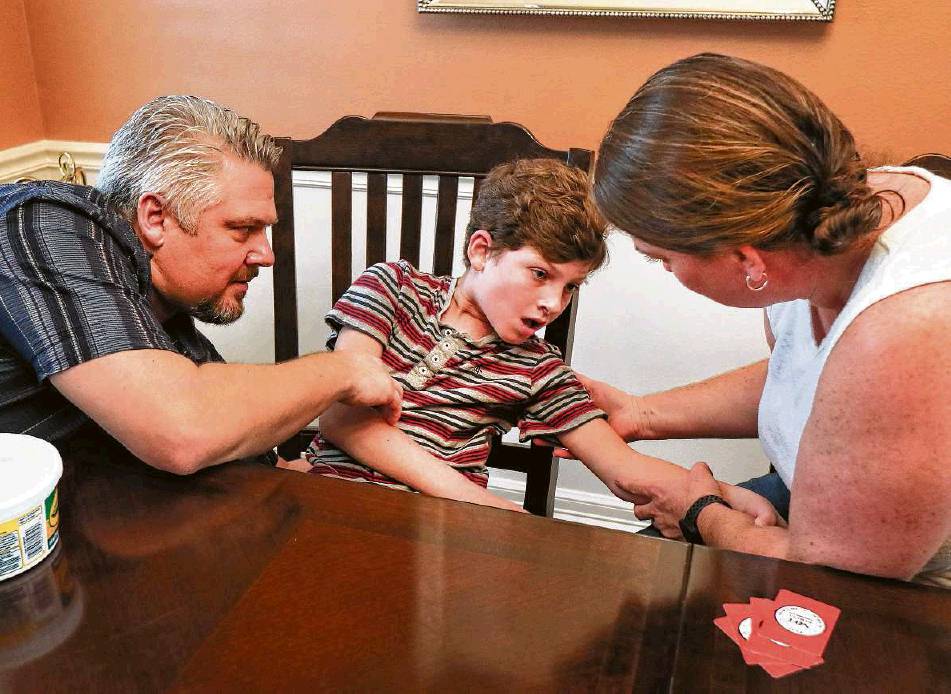574 Texans OK’d for medical pot
Program slow to roll out, but legislators seek to expand access
By Allie Morris AUSTIN BUREAU
AUSTIN — It’s been about a year since the first legally grown marijuana plants were harvested in Texas for their medicinal oils. But since then, fewer than 600 patients have seen any benefit out of the estimated 150,000 who suffer uncontrollable epileptic seizures that the medicine is meant to help.
Roughly 45 doctors, mostly concentrated in urban areas, have signed up to prescribe the cannabidiol. Just three companies in Central Texas have been licensed to distribute the drug. One doesn’t seem to have opened its doors, and another reports losing money with such a small client base.
“The way to assure the Compassionate Use Program has a future is by expanding access to more patients,” said Morris Denton, CEO of Compassionate Cultivation in the Austin area. “The worst thing that can happen is nothing gets done, because then we set the program back.”
Texas’ therapeutic marijuana program is among the strictest in the nation, giving only patients with intractable epilepsy access to cannabidiol that’s low in THC, the element that gives pot users a high.
Recent legislative efforts to expand the program failed. But some state lawmakers are trying again in 2019 with proposals to roll back restrictions on THC and give more patients access, including those with cancer, post-traumatic stress disorder and other serious medical conditions.
“This is not a liberal or conservative issue, this is amedical issue,” said Sen. José Menéndez, D-San Antonio, who has filed a bill to expand the program. “Why do we as a Legislature get to think we know better than the doctors? Why are we limiting this and keeping people that have glaucoma, MS, cancer, from having access?”
While the Texas House has been open to letting more patients use cannabidiol and marijuana for medicinal purposes, the state Senate and Gov. Greg Abbott have been resistant to such changes. Abbott has cited “abuses” in other states as cause for concern.
“I am still not convinced yet,” Abbott said in an October gubernatorial debate, a position that hasn’t changed, aspokesman said last week.
Marijuana is illegal under federal law and considered a Schedule I drug, alongside heroin and ecstasy. Thirty-three states, however, allow use of the drug for medicinal purposes, according the National Conference of State Legislatures. And 13, including Texas, let some patients use cannabidiol that is low in THC.
The Texas Compassionate Use Act became law in 2015, but the rollout has been slow and rocky.
Despite getting more than 40 applications, the Texas Department of Public Safety licensed just three companies last year to distribute cannabidiol, the minimum number allowed by the law.
Patients pay out-of-pocket
Patients need sign-off from two doctors to use the marijuana-derived oil. But so far, fewer than 50 certified epileptologists and neurologists have registered to participate. None is in the Rio Grande Valley or West Texas, records show, meaning patients there must travel far to see a qualified physician.
Some doctors are reluctant to enroll because Texas law requires they prescribe the drug instead of recommending it, a phrase other states use to sidestep federal marijuana prohibitions, advocates said. So far, 574 patients have been issued prescriptions, according to the Texas Department of Public Safety, which oversees the program.
“As we move forward, changing that language, I’m sure we are going to see the number of physicians grow exponentially and very quickly,” said Heather Fazio, with the Texas Marijuana Policy Project.
Then there’s the issue of getting the medicine. Patients must pay out-of-pocket for cannabidiol because health insurance won’t cover it. Denton said the average patient at Compassionate Cultivation uses 30 milliliters a month, at a cost of roughly $380.
Compassionate Cultivation and Knox Medical in Schulenburg, midway between Houston and San Antonio on Interstate 10, are taking patient orders. The third company licensed to distribute cannabidiol, Surterra Texas, doesn’t appear to have started making sales. A branch of Surterra Wellness, which this month announced chewing gum magnate William Wrigley Jr. would take over as CEO, didn’t respond to requests for comment.
Compassionate Cultivation has so far served roughly 450 patients, ranging in age from 6 months to over 60 years old, Den-ton said. Almost 95 percent of orders are for delivery, a costly prospect since Texas law requires the medicine be driven to customers by an employee. A delivery to a patient’s house in El Paso is a 16-hour round trip.
Bills face steep odds
Texas law enforcement groups have opposed loosening the restrictions on medical marijuana. And although a bill in 2017 to expand the Compassionate Use Program to more patients gained backing from nearly 80 state representatives — more than half the 150 member House — it never made it to the floor for a vote.
A number of marijuana-related policies are on the docket for the upcoming legislative session, which begins in January. But it’s not clear which might emerge as top priorities.
Recently, Abbott announced he’s open to decriminalizing possession of small amounts of pot, a policy some Texas cities and counties have already adopted.
Menéndez’s bill would expand the Compassionate Use Program to include some 20 other conditions, including Crohn’s disease, post-traumatic stress disorder and autism. It would also allow higher levels of THC.
Though the House has been open to loosening marijuana restrictions, the Republican expected to be speaker has opposed such measures. Rep. Dennis Bonnen, R-Angleton, was one of about three dozen members who voted against the Compassionate Use Act in 2015.
Republican Lt. Gov. Dan Patrick, who presides over the 31-member state Senate, didn’t respond to a request for comment. amorris@express-news.net
